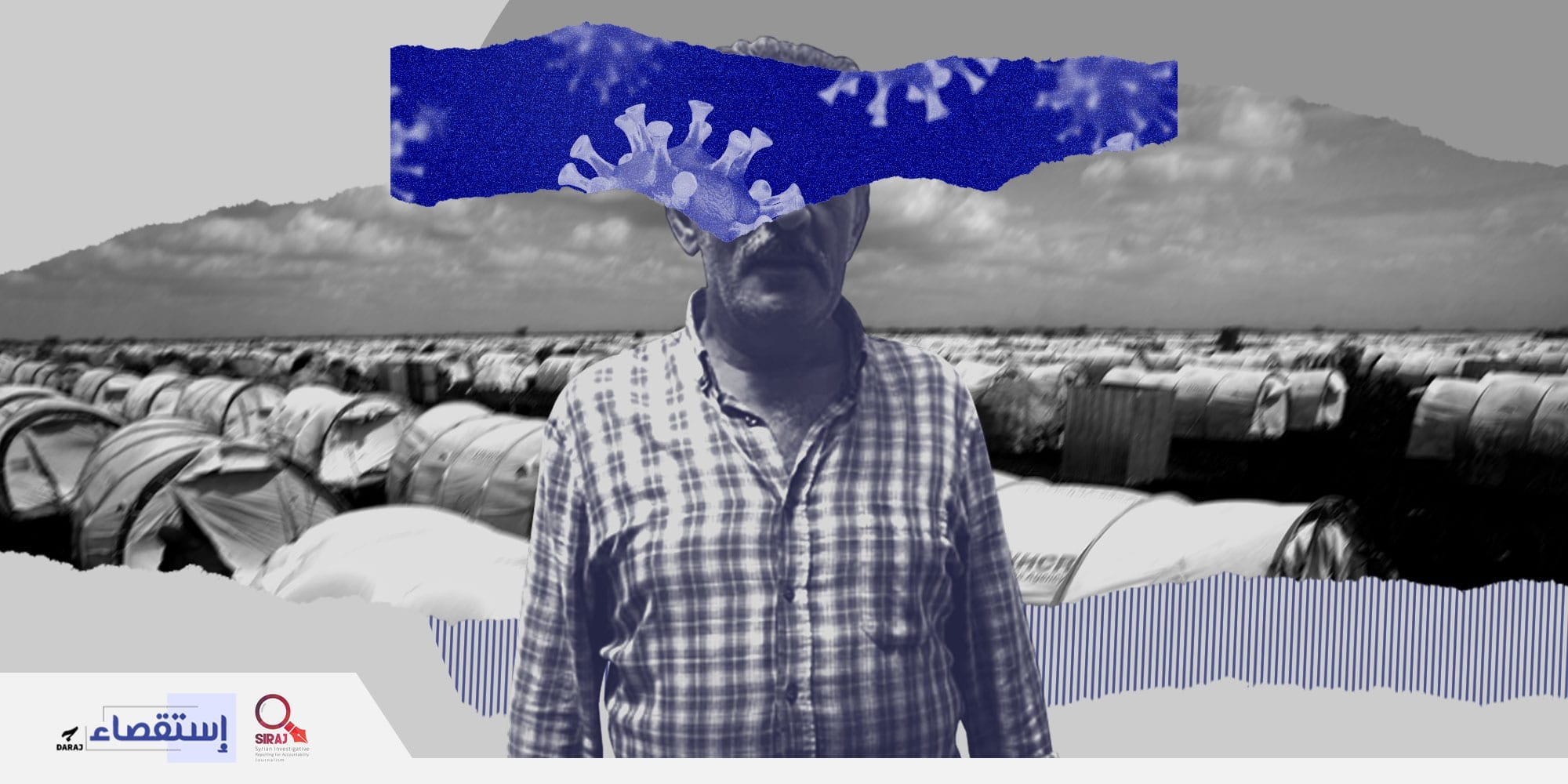It is not only making ends meet that worries Badriyah al-Jasim (55), a Syrian woman displaced from the countryside of Ma`arat al-Nu`man city. There is also COVID-19, which had her extremely worried and distressed, for healthcare services are almost non-existent in the camp where she lives with her children after her husband’s death. Badriyah grapples with several illnesses, including diabetes and hypertension that cast her into the group most vulnerable to COVID-19.
In Idlib’s countryside, elderly residents of informal camps are deprived of primary healthcare services, usually offered by makeshift hospitals, and quarantine facilities, which camp areas lack. The situation corresponds to increasing concerns over the outbreak since the first positive case was announced on 10 July 2020 by the Minister of Health of the Syrian Interim Government, who constantly posts updated case figures. In areas held by the Syrian regime, cases are also on the rise, amounting to 417, according to the Ministry of Health. Furthermore, cases throughout Syria are being tracked by the World Health Organization (WHO), which reports new confirmed cases, as well.
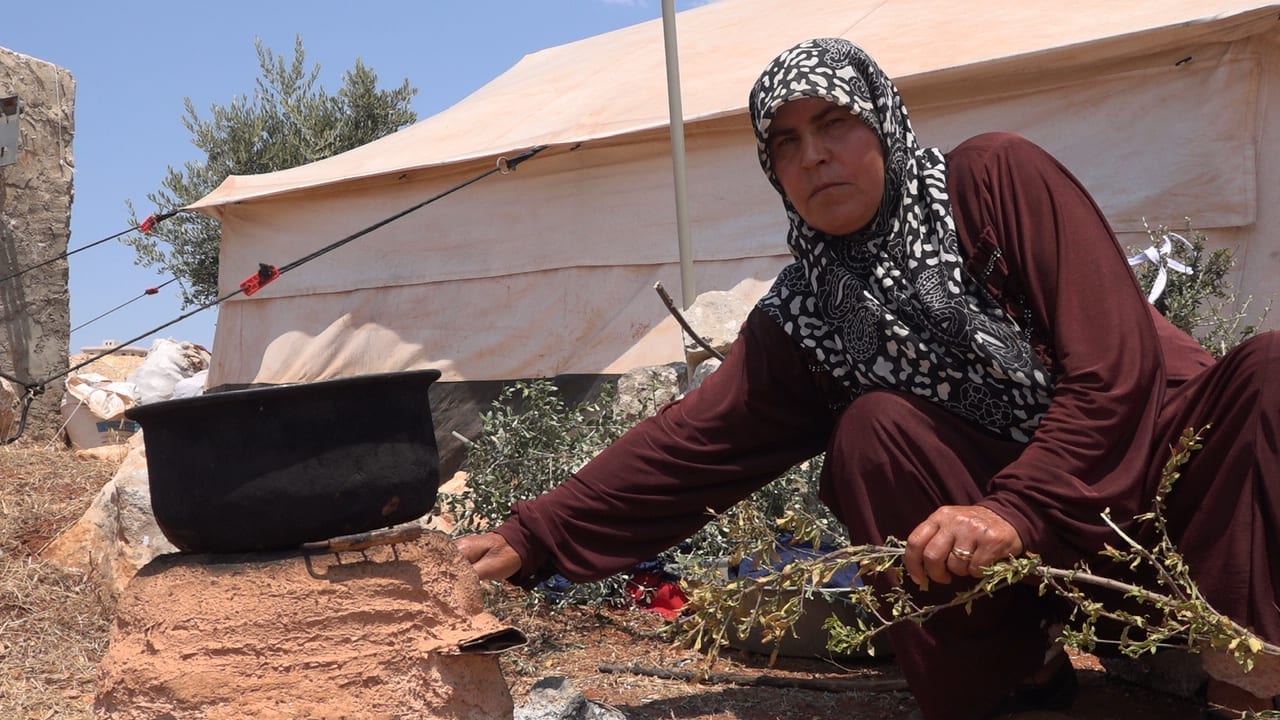
The United Nations (UN), for its part, warned against a healthcare catastrophe if the pandemic continues to spread significantly in north Syria, given the failing healthcare system, shortage for ventilators, and other supplies necessary for combating COVID-19. Moreover, the UN designated $385 millions to cover additional 2020 needs, as to cope with the pandemic in the full range of Syria.
Nonetheless, it appears that the UN warnings are in no way close to being heeded.
Suffering from diabetes and hypertension, Badriyah is fretting over contracting coronavirus, saying that she is regularly feverish due to the extremely hot weather. This had her obsessed, particularly with the surge in confirmed cases.
Like most of the elderly in the informal camps, Badriyah complains about the absence of healthcare facilities, while test centres are tens of kilometres away from the camp where she lives. The situation is made further complicated by extreme poverty and the people’s inability to reach these centres to conduct the necessary texts or purchase preventative needs.
Camps off preventative formworks
One-third of Idlib’s population lives in tents, urging Cristian Reynders, Doctors without Borders (MSF) field coordinator for northwest Syria, to say that indeed, most recommendations for protecting people against the virus and slowing down its spread simply cannot be implemented in Idlib. He, furthermore, raised an ethical question, that probably will remain unanswered: “People are also asked to practice good hygiene measures and wash their hands frequently. But how can you practice good hygiene when you live surrounded by mud?”
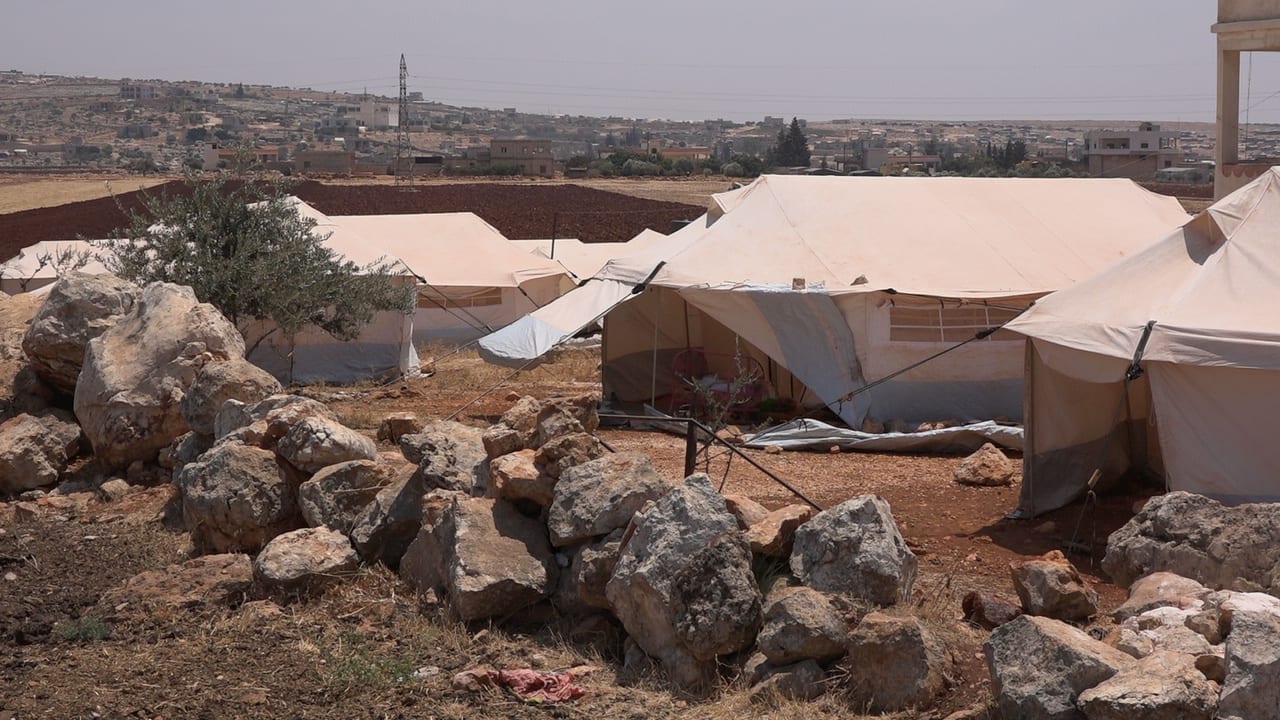
Sharing Reynders’ thoughts on the matter, Ahmad al-Dabis, UOSSM Syria Program director, told the reporter that: “Preventative measures cannot be maintained in the camps, for they are extremely crowded. Moreover, the personal hygiene-related preventative rules cannot be kept due to lacking water, sanitation and joint bathrooms, which do not adhere to requirements. This applies to villages and cities alike, for there are group housing places that cannot be controlled, not to mention that thousands of families are coerced to share one or two rooms with one or more families.”
UOSSM is a non-government union for relief and healthcare organizations, registered in Turkey, UK, US, Canada, France, Germany, Netherlands and Switzerland.
Displaced from southern rural Idlib, Abu Ahmad (64) lives in an informal camp near the Turkish border. He does not show the slightest interest in our COVID-19-related questions after the first positive case was reported in north Syria. He is, rather, busy counting the money he made today for working on a nearby farm. “We do not care about Corona any more. Even without it, we were barely having enough food. Anyways, we are almost dead,” he said. “How could we keep preventative rules? Is it with masks, sanitizers and detergents that cost a fortune, or with dirty shared bathrooms? Or should we do it with water that we do not really have?”
On his turn, Yakoub Murad, a Syrian doctor based in the Turkish city of Reyhanlı, explained that to boost the immune system, older people need to eat various types of healthy food, maintain psychological stability, and keep away from stress and anxiety. Even upon contracting the virus, they have to uphold the same measures. However, none of these requirements can be met in the camps, for living conditions are pretty challenging there, at the villages also, including that mad rise in prices and lacking emotional stability caused by military operations and constant displacement.
Nursing homes in the clutches of fear
Mustafa al-Nasser (63), originally a resident of Damascus, has been living in Dar al-Salama Nursing Home in Azaz City, northern rural Aleppo, for three years, after he lost his family, wife and three children in the military combat in 2012. “I am scared that the disease might spread here as well. I quit going outside altogether. I no longer shake hands, and I frequently wash my hands. I am not sure when the disease will disappear, but I always wonder, what would happen to me if I caught the virus? What if I needed healthcare?” he said.
Founded in 2013, the nursing home was a mere tent, with a capacity to accommodate nine persons. In early 2018, however, the nursing home was moved to a four-room-building, with utilities. Today, the home can host 18 to 25 persons, along with six staffers.
Ziad Najar, the nursing home director, stressed that the management was keen on adopting preventative measures against COVID-19, including disinfecting the building, distributing masks, washing clothes on a regular basis and preventing elderly from mixing with strangers. A number of the inmates are mentally-disordered, who cannot be controlled in terms of hygiene and social distancing, while tightness of space continues to give them a hard time, he added.
The nursing home does not receive stable funding from any entity, Najar reported, and it is completely dependent on personal donations, adding that the home is today deficient and burdened with debts. Asking the director about potential COVID-19 positive cases, he said: “Inmates are transferred to the nearby International Blue Crescent Hospital once suspected of contracting the virus. But still, we are not sure how we will manage if cases continue to increase.”
In north Syria, places such as first-class nursing homes do not exist. Rather, there are big and modestly furnished houses, occupied by elderly and persons with disabilities, which are operated through personal donations only, spreading in Salqin, Azaz, and al-Dana, among other areas. In the strip between rural Aleppo and Idlib, where four million persons at least live, quarantine facilities are either lacking or are not properly equipped to accommodate elederly, who might contract the virus.
Fear and concern necessitate unity
Difficulties suffered by elederly and nursing homes in north Syria almost match those endured by old people in the northeastern parts of the country, particularly in al-Hasaka and Raqqa, where the Women’s Committee of the Autonomous Administration supervises nursing homes.
In Rmelan, far east of Syria, officials, running the Viyan (Emarah) Elderly Women Nursing Home, are also facing COVID-19 severe repercussions and its ever increasing threat, amidst shortage for supplies and medicaid.
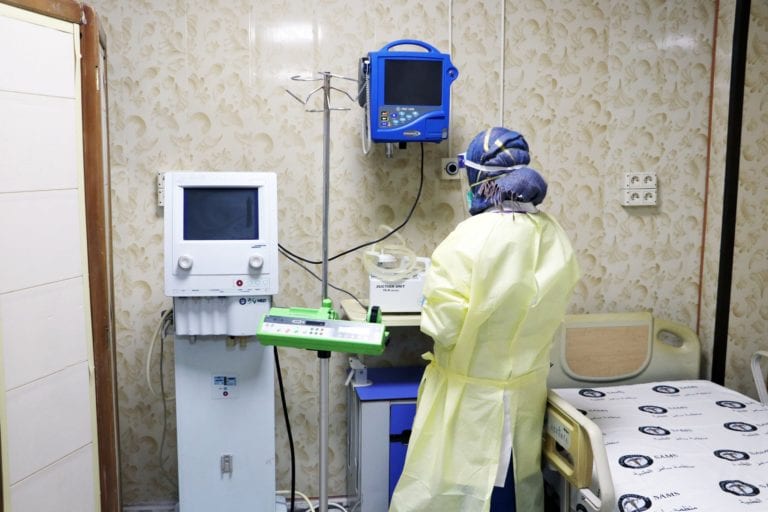
Opened in March 2016, the nursing home has the capacity to accommodate 10 women only, and it is run by four women staffers, who take turns around the clock.
“Even staffers must adhere to certain daily measures. They have to change their clothes upon entering the nursing home, for instance. They also have to keep their hands sanitized and masks on all the time. Furthermore, they are on a diet, drinking lots of liquids and eating fruits, to boost their immune system in case an outbreak occurs,” Najah, a supervisor at the nursing home, said.
Family visits are also conditioned by a set of preventative measures, which the home adopts to protect the eledrly women, including social distancing, wearing masks, disinfecting hands and keeping a safe distance as a basis to prevent the transmission of the virus.
“A major difficulty that we constantly face is that eledrely women have their families in mind all the time. One woman, for example, asks her son to come and see her regularly; another asks her daughter to do so; a third would miss having her sisters around. We, thus, ask family members to visit the elederly women at their request. When the latter meet their relatives, the emotions we get to feel cannot simply be put into words,” Najah added.
insufficient awareness and prevention
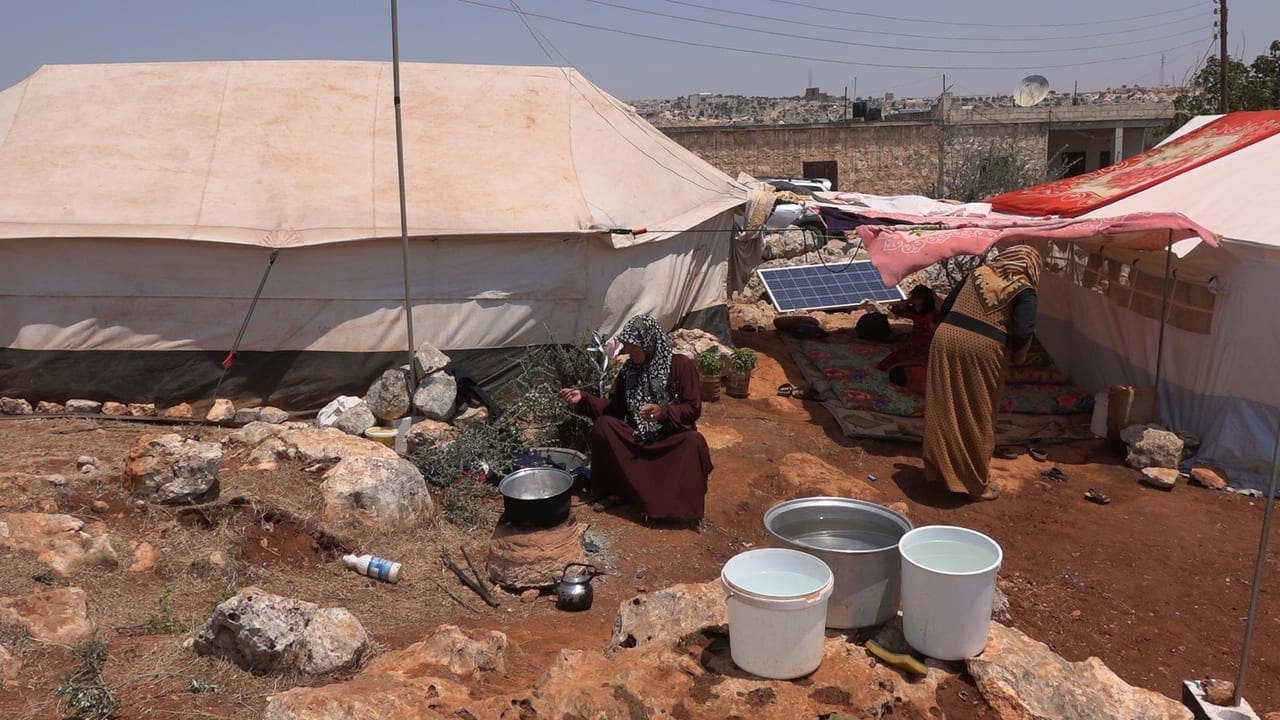
Addressing responsive action in the area, Dr. Ahmad al-Dabis pointed out to the awareness campaigns launched by UOSSM, which target locals in the suburbs of Aleppo and Idlib, adding that masks, disinfectants, sinitizers, and gloves were distributed at the camps, particularly to the most vulnerable groups, including elderly and people suffering from chronic diseases, such as diabetes, cancer, asthma and hepatitis. The population is massive and the demand is overwhelming, al-Dabis said, stressing that UOSSM’s response covers very little of the humanitarian needs of four million civilians in the area.
Suffering thus at the camps, some hundred thousand internally displaced persons (IDPs) decided to abandon the tents and head back to their destroyed homes, mostly located near fronts or war lines, one of whom was Abu Muhammad. The sixty-something man went back to his home in Taftanaz city, rural Idlib. Having returned, Abu Muhammad told the reporter that he is not scared of the disease anymore, for he washes frequently to perform prayers. At the same time, he noted that no leaflets were distributed, nor prevention-aimed awareness campaigns were launched to address the disease, adding that he performs group prayers everyday because the pandemic has not spread in the city yet. Furthermore, staying in his city, despite the danger and the bombing, is better than being displaced at the camps, where preventive measures and healthcare services are nonexistent, he said, especially that at a certain point he was coerced to share the same room with 13 other people when he was still at the camp.
Interviewed in Taftanz city too, Basheer al-Khatib, seventy-something, said that he tries to keep a distance from people with flue, refrains from showing up at public gathering places and tight spaces were people tend to assemble, stressing that no prevention-awareness campaigns are addressing the disease, despite the large population density. Masks or disinfectants were not distributed, as well.
Almost in all the cities in north Syria, bazzars, popular markets opened on specific days of the week, were still being held when the report was being prepared, and no decisions were passed as to officially prevent such gatherings.
The Early Warning Alert and Response Network (EWARN), a local healthcare group operating in north Syria, posted counsel and guidance to help edlerly protect themselves from contracting COVID-19, including washing hands, avoiding large-scale gatherings and staying away from people showing symptoms of any illnesses.
Moreover, the EWARN stressed that diabetic people must ont skip their medications and that they should closely monitor their blood glucose, adding that people should immediately seek medical assistance upon coughing, having a fever or shortness of breath, pointing that asthma patients must keep inhalers close by. Cancer patients, the group advised, must also seek medical assistance upon coughing, having a fever or shortness of breath, accentuating that keeping these measures is a necessity, for no vaccine or treatment has been developed to counter COVID-19 so far.
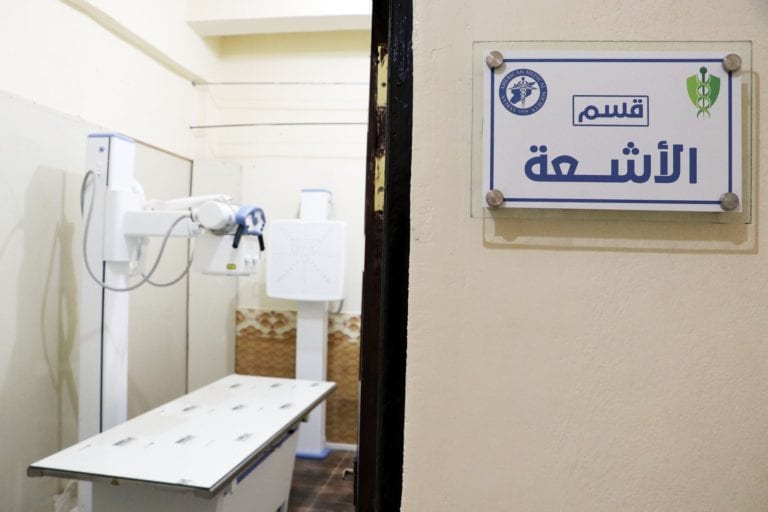
Healthcare facilities out of service
In northwest Syria, namely Idlib and rural Aleppo, medical supplies are very few, for healthcare sectors were systematically targeted by Russia and the Syrian regime in early 2020. The military campaigns rendered about 70% of the healthcare facilities out of service, estimated at 75 makeshift medical posts, either dispensaries or hospitals, that were inoperable partially or completely. Additionally, a number of facilities were turned unserviceable when controlled by the regime’s forces.
This situation, UOSSM reported, led to the collapse of the already over stretched healthcare system. There are 200 intensive care beds, and only 100 ventilators for more than four million people, which are extremely insufficient to accommodate Covid-19 patients, especially since these modest numbers of beds and ventilators are already in use, accommodating cancer, trauma, and wounded patients, as well as those with cardiac and liver diseases.
The Ministry of Health of the Syrian Interim Government, for its part, stated that since it first started to conduct Covid-19 tests last March, about three thousand people were examined, as they were suspected of being infected with the virus, adding that most of the tests were carried out at a single testing center and using the only device available. Confirmed cases in the target areas amounted to 12, when the investigation was being conducted on 18 July.
Alarming scenarios
On 7 May 2020, a predictive report, obtained by the reporter, prepared by the Health Information Unit (HIS) of the Health Directorates in northwest Syria, in cooperation with a number of Syrian and international experts, showed that either of the three following scenarios lies ahead of the area.
The first scenario expects that in the eighth week into the outbreak, positive cases will jump to 16,384, while 2,458 cases will need hospitalization. The severe cases, however, that require admittance into intensive care and ventilators will be 819.
In the eighth week, the second scenario expects, positive cases will mount to 185,364, including 9,268 requiring intensive care and ventilators.
As for the third scenario, it focuses on the status of the population most in need, namely the newly displaced and elderly, whose number amounts to 1.2 million. This scenario expects that in the sixth week, the number of cases will reach 240,000 in the camps alone, 12,000 of which will require intensive care and ventilators.
Given these alarming predictions and the scarce resources of the healthcare sector, elderly will be in a battle with the pandemic, unprotected and uncared for, particularly those living in the camps.
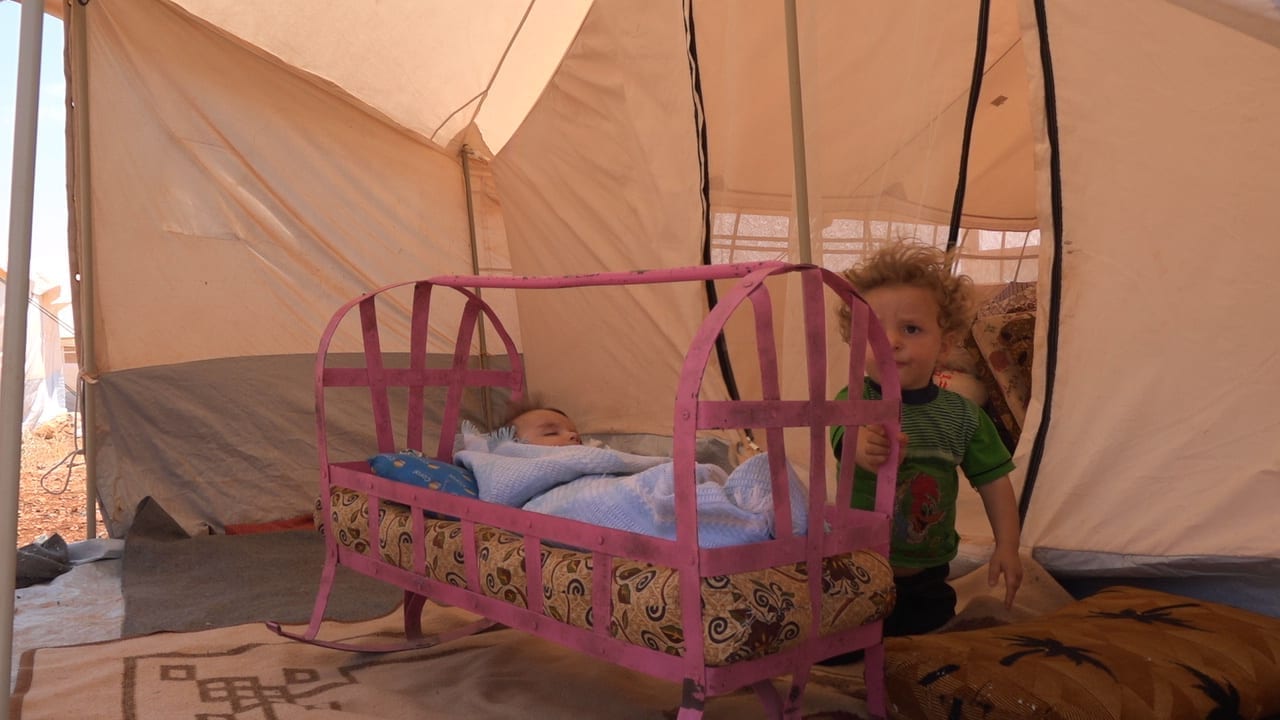
During the latest military campaign, which Russian and regime forces embarked on in early 2020, about one million Syrians from Hama, Idlib and Aleppo suburbs were displaced to separate areas of northwest Syria, bringing the total number of displaced people there to 1.4 million, according to statistics issued by the United Nations Office for the Coordination of Humanitarian Affairs (OCHA) in May 2020. These people reside either in uninhabitable homes or in official or otherwise unofficial camps, most of which lack all life’s essentials, thus, turning them into the most vulnerable group to contract Covid-19, since the random environment and absence of hygiene measures, drinking and household water, and disinfectants make the area an ideal incubator for the the virus to spread, as reported by the HIS of health directorates in Idlib.
In a tweet, Mark Cutts, the UN deputy regional humanitarian coordinator, warned against a modest response to the predicted health disaster, which he attributed to the reduced number of authorized crossings for the crossborder response into northwest Syria, decided by the Security Council in its recent meeting on the means of delivering humanitarian aid to north Syria.
The warning was also echoed by Dr. Muhammad al-Issa, the health official of SAMS office in Turkey (the Syrian American Medical Society), who said that the pre-Covid-19 health status was already critical and that people with chronic diseases were not fully provided with needed healthcare services. If the pandemic spreads, some healthcare facilities might turn inoperable, unable to provide primary services necessary to combat the outbreak, which places north Syria before a new healthcare dilemma.
Regarding SAMS precautionary measures, al-Issa added that it has conducted (online) training, preparing many medical staffers to cope with COVID-19, and set up three quarantine facilities, in addition to the logistic support it provided to healthcare facilities as to help them affront all outbreak forms, explaining that the healthcare sector in Syria ranks as low as the second place out of five, the thing that keeps it out of international top ratings.
Given that situation, while UN and non-government organizations fail to answer the needs reported above, Badriyah will continue to be caged by fear, and hundreds of thousands of old people will be having an unfair battle against a fatal pandemic that might bring them to their demise.
The Syrian Investigative Reporting for Accountability Journalism (SIRAJ)
Accounts addressing northeast Syria were obtained by colleague Rusheen Habo, based in al-Qamishli.
